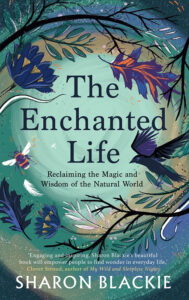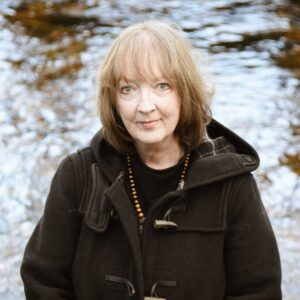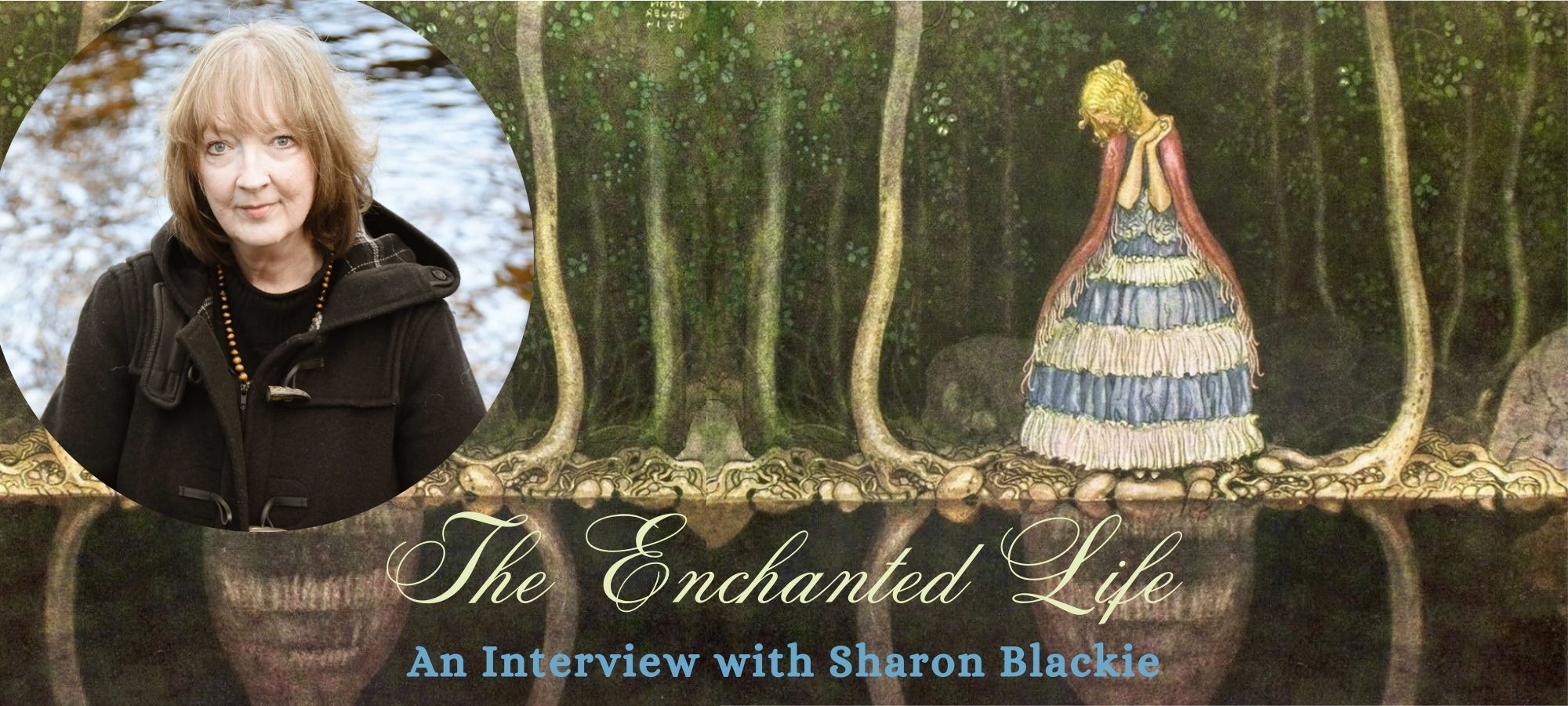Sharon Blackie is a psychologist, mythologist, and author of the best-selling If Women Rose Rooted, among her many other publications. The Sunday Times says of her, “She knows her archetypes, knows her Jung, knows her fairytales, and knows her neuroscience, and is sick of being patronised by men who don’t.” She is also teaching Pacifica Extension and International Studies’ “Graduate Certificate: Finding Ourselves in Fairytales: A Narrative Psychological Approach” May 18th – December 7th, 2024. I’m delighted to hear from Sharon about her work and perspective.
Angela Borda: Fairytales are told to children, often in far less scarier versions than the original, to encourage magical thinking and imagination and fun. But then at a certain point, society feels it has to tell kids that these were all make believe. There are no magical creatures, no adventures to be had in the woods, no witches or fairy godmothers or goblins. It’s time to get serious about life. What a terrible thing to do to a child. Why is returning to these tales as an adult key in learning about our psyches?
 Sharon Blackie: Fairy tales are a remarkably rich repository of diverse archetypal patterns and images which enable us to shed light on and work through so many human experiences. And in her 1970 book, The Interpretation of Fairy Tales, Marie-Louise von Franz describes fairy tales as ‘the purest and simplest expression of the collective unconscious psychic process … representing the archetypes in their simplest, barest and most concise form.’
Sharon Blackie: Fairy tales are a remarkably rich repository of diverse archetypal patterns and images which enable us to shed light on and work through so many human experiences. And in her 1970 book, The Interpretation of Fairy Tales, Marie-Louise von Franz describes fairy tales as ‘the purest and simplest expression of the collective unconscious psychic process … representing the archetypes in their simplest, barest and most concise form.’
But most importantly for me, they help us to reimagine ourselves, because at the heart of every single fairy tale is transformation. They help us to believe in the possibility of change. We come to see that there are other ways of imagining the world and our place in it – and of living more intensely, and more richly, in a world that is so often filled with challenge, and sorrow.
Working with the archetypal characters, patterns and images in fairy tales is also to engage in intentional acts of imagination, and so to participate fully in the process of soul-making.
Angela: April 27th is National Tell a Story Day, not to mention that March 20th was World Storytelling Day. The method by which we tell stories may have changed from an oral tradition to a digital one, but clearly the importance of stories endures in the human world. Bees tell each other the story of where the best flowers are, whales sing to each other. But as far as I know, humans are the only species that tell stories that don’t pertain to the necessities of food and safety. What do you consider to be the function and importance of storytelling, not just on given days of celebration, but year-round?
Sharon: You know, I do wonder about that idea. We assume that animals have no imaginal life but if we think of the entire world as ensouled, as James Hillman proposed, for example, then animals – and trees and rocks and rivers – by definition must have/participate in soul, just as we do. In southern Africa, some of the old cosmologies say that birds sing their sound-stories not just to attract a mate but to wake the world up and keep it turning; without them, there would be no dawn and the world would fail. And I know what a crow is in my mythology, but I often wonder what I am in the mythology of a crow. (There is no doubt in my mind that corvids have a mythology! Look at them – how could they not?)
But when it comes to humans, what’s clear is that we really are storytelling animals, hard-wired for story. We don’t always appreciate the extent to which stories dominate our lives, and the many ways in which we’ve been shaped by them. But we’re born with an innate storytelling capacity. We begin to perceive, explain and make sense of the world through the stories we find in childhood – or the stories which find us. They are the stars we navigate by. Stories teach us everything we know, and their lessons are deep and rich. Anywhere, there may be a door to another world: learn to look for it. Always leave a trail of breadcrumbs to find your way out of the dark wood. Don’t maim yourself trying to fit into the glass slipper which was made for someone else. Gold is never a good goal. Never take your skin off and leave it unattended.
And of course, we tell stories every day, whenever we introduce ourselves and tell people a little something about who we are and where we come from; when we tell a new friend the story of our life; or when we tell a partner about something that happened to us today.
I firmly believe that harnessing this storytelling ability is crucial is we want to create change – in ourselves, or in the world around us. If we don’t like the stories that the culture tells about women, for example – and especially about older women – then we need to tell some different, more functional stories of our own.
Angela: How did you become interested in depth psychology and mythology? And is the upcoming certificate program your first interaction with Pacifica?
Sharon: I’ve been fascinated by myths and fairy tales since I was a small child; they kept me sane during a challenging and poverty-stricken childhood. And so it seemed inevitable that they should find their ways into my books (including my first novel, The Long Delirious Burning Blue, which had a strong theme on the power of myth and storytelling) and then into my therapeutic work.
My psychology degree, which I began when I was 18, was unfortunately very behaviorist in nature. We were hardly permitted to say the word ‘mind’, because you couldn’t see a mind and so, unlike the brain, it couldn’t really be said to exist. Go figure. We had five minutes on Freud in one lecture, but Jung’s name was never even mentioned. And that very behavioral approach and focus on the brain and biology led me to become an academic neuroscientist in the first part of my adult life. So it wasn’t until I was forty, three midlife crises on, that I properly discovered and delved into Jung and other depth psychologies, when I was retraining in various modalities to be able to practise as a psychologist. I was ready for Jung then: I was fully engrossed in that second-half-of-life search for meaning and purpose. And when, later, I discovered James Hillman and his work on image and the imagination, I was hooked forever.
My interest, then, is in combining both sets of academic qualification: the psychology as well as the mythology and folklore. I’m interested especially in breathing new life into archetypes of womanhood, and the ways in which older, let’s say ancestral, representations of archetypes can inform us today. I don’t see archetypes as static patterns: they grow over time, and they grow with us and inside us. They have their own process of becoming, and if we learn not just to pay attention to them but to work with them, they can inform ours.
I visited Pacifica in person in 2018, thanks to an invitation from Mary Wood, Juliet Rohde-Brown and Victoria Stevens. I gave a lecture on ‘Women, Waters and Wastelands’ – a discussion of women in Celtic myth and folklore. And last year, I presented a six-part online program centered around Hagitude and reimagining the second half of life. So this is my third interaction, and I’m delighted to be working more closely with you all. Pacifica is clearly the world’s preeminent academic institute for psychological and mythological studies within the framework of depth psychology, and so it feels to me like a perfect fit.
Angela: Your upcoming publication project is Wise Women: a new mythology of older women, out in October 2024. What can we look forward to in this book?
Sharon: When I was writing Hagitude, I had completed the first part of a five-year research project to go through every collection of European folk and fairy tales that I could find (I was confined only by what was available in translation) as well as many volumes of European mythology, looking for the older woman characters. When we think of older women, especially in fairy tales, we usually think of the wicked witches. But I wanted to see whether a more diverse collection of older woman characters existed in these stories, who could tell us something about what it might be to live meaningfully and authentically in the second half of our lives today.
I conceived Wise Women immediately after writing Hagitude because I hadn’t had room in the latter to tell those women’s stories in full, or to write about the entire, lavish array of enchanting elder women I’d happened across in my continuing research. So in this new book, I brought together the complete collection of stories (and other folklore) I’d gathered for the first time, retold in clearer and more contemporary language. And each story is followed by a psychological commentary which reflects on the ways they can inform and inspire the second half of our lives. The stories are populated by older women who hold the protagonist’s fate in the palm of their gnarly old hands, who see the bigger picture (and probably were the ones who painted it in the first place), or who have the last laugh. There’s a wonderful array of ungainly giantesses, glamorous fairy godmothers, misunderstood witches, fierce grandmothers and funny and perspicacious wise women. They’re absolutely glorious.
Angela: Thank you so much for speaking with me and I look forward to learning more about the enchanted life!
For more on Fairy Tales from Sharon Blackie, read Part I here. For more information on the class, visit Extension here.

Dr. Sharon Blackie is an award-winning author and psychologist with a background in mythology and folklore. Her highly acclaimed books, lectures and teaching programs are focused on reimagining women’s stories, and on the relevance of myth, fairy tales and folk traditions to the personal, cultural and environmental problems we face today. As well as writing five books of fiction and nonfiction, including the bestselling If Women Rose Rooted, her writing has appeared in anthologies and in several international media outlets. She’s a member of the Royal Society of Arts, and her awards include the Roger Deakin Award and a Creative Scotland Writer’s Award. Her next book, Wise Women: A New Mythology of Older Women will be published by Virago (UK) and New World Library (North America) in 2024.

Angela Borda is a writer for Pacifica Graduate Institute, as well as the editor of the Santa Barbara Literary Journal. Her work has been published in Food & Home, Peregrine, Hurricanes & Swan Songs, Delirium Corridor, Still Arts Quarterly, Danse Macabre, and is forthcoming in The Tertiary Lodger and Running Wild Anthology of Stories, Vol. 5.


